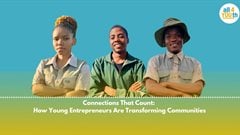#NedbankIMC2024: Why today's businesses need to ground success in more than profit

Frank van den Driest, speaking at the Nedbank IMC Conference, argued that this narrow focus has come at a significant cost—not only to businesses but also to society at large.
"What we've witnessed since Milton Friedman’s statement is a surge of greed and an overwhelming focus on short-term gains. The formula for many companies became clear: achieve scale through new markets, adjacent categories, and mergers, then ruthlessly cut costs to boost quarterly profits. This mantra defined successful business practices," he said.
Van den Driest emphasised that the time has come for businesses to shift away from the profit-maximisation mindset that Friedman championed. “We need to move beyond seeing profit as the only measure of success,” he urged, “and start recognising the long-term value created for all stakeholders—employees, customers, communities, and shareholders alike.”
A historical perspective on business's role
Van den Driest drew on historical examples, such as Unilever and Hershey's, which viewed their roles as integral to the communities they inhabited. These companies didn't just aim for profit; they sought to create value for everyone involved. Their leaders understood that when businesses thrive, society thrives.
“Hershey's did not just build a chocolate empire; they built a community,” van den Driest remarked, illustrating how businesses can integrate their success with the health of the communities they serve. However, over the decades, this ethos became overshadowed by the singular focus on shareholder returns, often leading to corporate practices that prioritised short-term profits over sustainable growth.
The shift began to unravel with the dramatic decline of Kraft Heinz in 2019, when the company admitted its business model was broken, attributing its failures to an overemphasis on short-term gains. “Kraft Heinz was a wake-up call,” van den Driest noted. “It showed that chasing quick profits can lead to long-term disaster.” This marked a pivotal moment in corporate philosophy, as more businesses began to recognise the necessity of a balanced approach to growth.
Embracing stakeholder value
Van den Driest highlighted findings from the Institute for Real Growth, which revealed that businesses experiencing sustainable growth had shifted their focus to creating value for all stakeholders. “The future of business lies in embracing stakeholder value,” he asserted. This transformation is particularly relevant in the South African context, where socio-economic challenges demand a more responsible and inclusive business approach.
Today’s consumers are more informed and empowered than ever. They expect transparency, ethical practices, and a commitment to social responsibility from the brands they support. “Consumers are not just looking for products; they are looking for purpose,” van den Driest explained. This shift in consumer expectations presents a unique opportunity for businesses to realign their strategies, focusing on long-term growth that benefits everyone.
The methodology behind success
Van den Driest's approach is based on rigorous analysis of feedback from hundreds of respondents, categorising companies into two groups: those that consistently outperform their competitors and those that lag behind. This dichotomy serves as the foundation for a roadmap aimed at achieving humanised growth.
Phase 1: Grounding in Reality
The journey begins with a thorough grounding in reality. Organisations must introspectively assess their DNA, heritage, and values. Van den Driest stressed that understanding what a company stands for and where it draws the line is crucial for aligning with stakeholder expectations. He introduced the concept of a materiality matrix to help organisations identify the issues that matter most to their stakeholders and the impact those issues have on the company.
High-performing companies excel not just at identifying key concerns but also at engaging with their stakeholders. For instance, he cited Novo Nordisk, which holds in-depth conversations with diabetes patients to understand their struggles better and forge closer connections.
Phase 2: Reimagining the Future
Once grounded, the next step is to reimagine the future. Van den Driest highlighted the example of General Motors’ CEO, Mary Barra, who effectively navigated the shift toward electrification with her “Zero Zero Zero” vision. This vision is simple, memorable, and compelling, serving to align internal colleagues and external stakeholders around a shared goal.
In this phase, leaders must articulate their aspirational roles or purposes within that vision. Van den Driest pointed to the success of companies like Nando's, which not only engages in social initiatives but also embodies its values in its operations.
The Four Boxes of Purpose
The concept of purpose was another critical theme in van den Driest's speech. He explained that true purpose must tick four essential boxes: what the world needs, what the company excels at, what generates profit, and what employees are passionate about. This holistic approach ensures that the purpose resonates deeply with all stakeholders.
However, van den Driest cautioned that the term "purpose" has become somewhat diluted, often associated with "woke" culture. He stressed the importance of authentic implementation of purpose, which should guide decision-making both rationally and emotionally. For example, Nike's commitment to athletes is evident in its support for Colin Kaepernick during controversial times, demonstrating a true alignment with their brand DNA.
Phase 3: Focusing on Transformative Change
After grounding and reimagining, organisations must focus on transformative change. Van den Driest emphasized the importance of having an integral story that encompasses all stakeholders, rather than engaging in opportunistic communication that can lead to a reactive mode of operation.
He illustrated this point by referencing a study from a business school that analysed social media posts from various companies. High-performing organisations discussed growth, stakeholder engagement, and profit in a cohesive manner, while underperformers tended to address these concepts in isolation.
Phase 4: Organising for Systemic Change
The final phase involves organising for systemic change. Van den Driest stressed that driving stakeholder value requires collaboration across departments. He shared statistics highlighting that two-thirds of over-performing companies successfully work collaboratively, while less than 10% of underperformers manage to do so.
By breaking down silos and fostering cross-functional cooperation, organisations can achieve a more comprehensive understanding of their impact and drive meaningful change.

About Karabo Ledwaba
Karabo Ledwaba is a Marketing and Media Editor at Bizcommunity and award-winning journalist. Before joining the publication she worked at Sowetan as a content producer and reporter. She was also responsible for the leadership page at SMag, Sowetan's lifestyle magazine. Contact her at karabo@bizcommunity.com

Related
Brands, stop relying on stereotypes to connect with Gen Z 13 Jun 2025 Vaseline and Krispy Kreme team up to shine with the 'glazed' trend 9 Jun 2025 Snackable content not a fad but a response 5 Jun 2025 Brand Finance: Automobile, watch and cosmetic brands the world's most valuable luxury brands 27 May 2025 15th Annual Brand Africa 100 | Africa’s Best Brands: African optimism vs declining brand loyalty 27 May 2025 Nigeria's banking brands dominate 26 May 2025


































